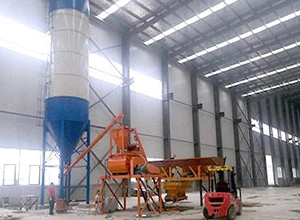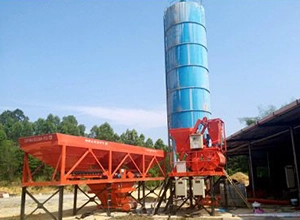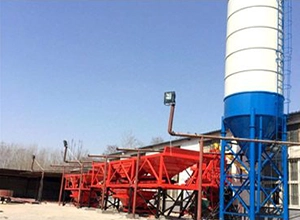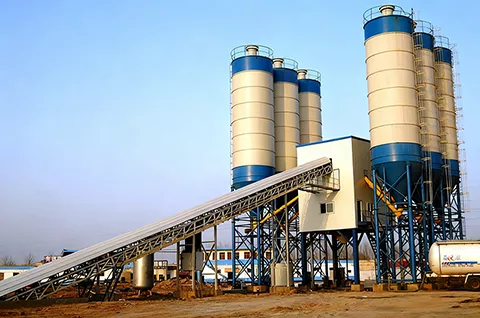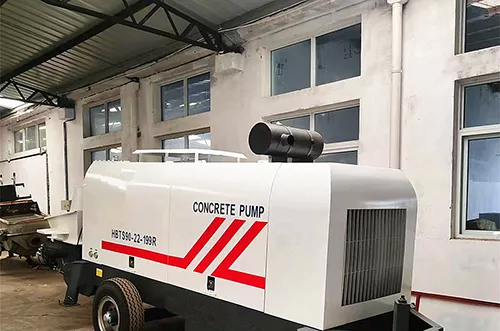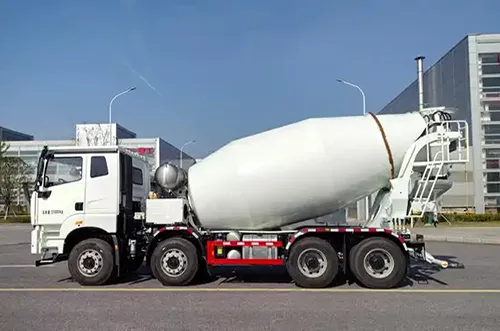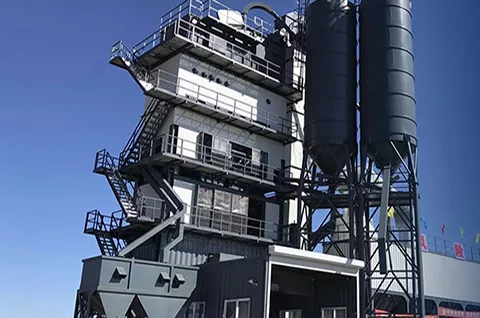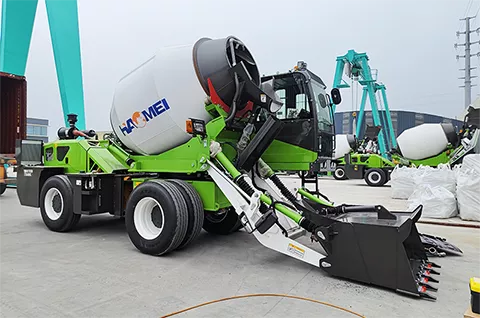A concrete mixer is a machine that mixes cement, aggregates, and water to produce concrete mixture, and it mainly consists of a mixing drum, feeding and discharging mechanisms, water supply system, prime mover, transmission mechanism, frame, and supporting devices.

Concrete mixers can be classified into gravity (self-falling) type and forced type according to the mixing principle. The forced mixer uses rotating blades to forcibly change the movement direction of the materials, featuring high mixing efficiency, minimal residue, and easy cleaning.
Haomei Concrete Mixer Machine for Sale
-
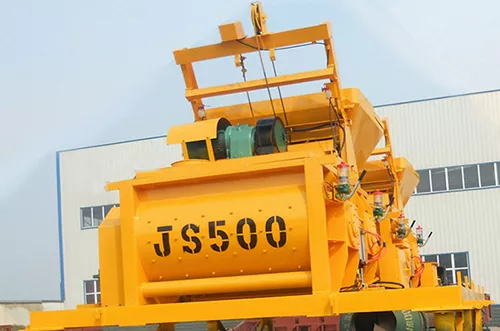 JS500 Concrete Mixer
JS500 Concrete Mixer
Discharging Volume: 500L | Capacity of Mixer: 0.5 m³
-
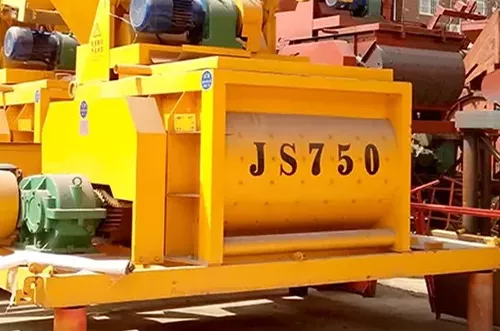 JS750 Concrete Mixer
JS750 Concrete Mixer
Discharging Volume: 750L | Capacity of Mixer: 0.75 m³
-
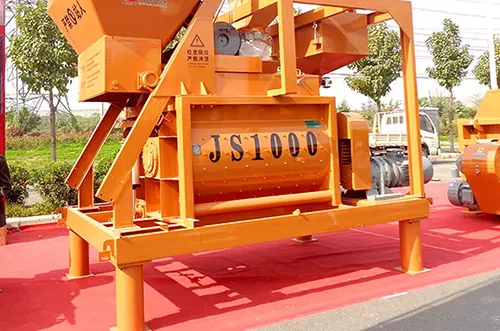 JS1000 Concrete Mixer
JS1000 Concrete Mixer
Discharging Volume: 1000L | Capacity of Mixer: 1.0 m³
-
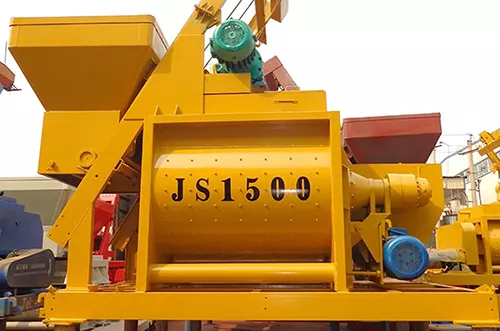 JS1500 Concrete Mixer
JS1500 Concrete Mixer
Discharging Volume: 1500L | Capacity of Mixer: 1.5 m³
-
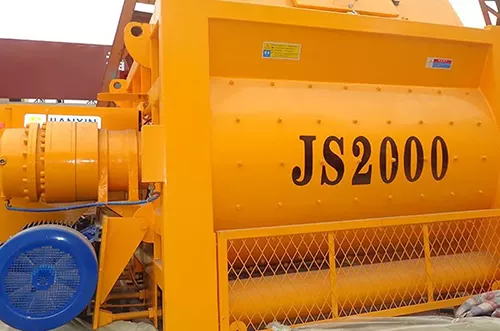 JS2000 Concrete Mixer
JS2000 Concrete Mixer
Discharging Volume: 2000L | Capacity of Mixer: 2.0 m³
-
 JS3000 Concrete Mixer
JS3000 Concrete Mixer
Discharging Volume: 3000L | Capacity of Mixer: 3.0 m³
-
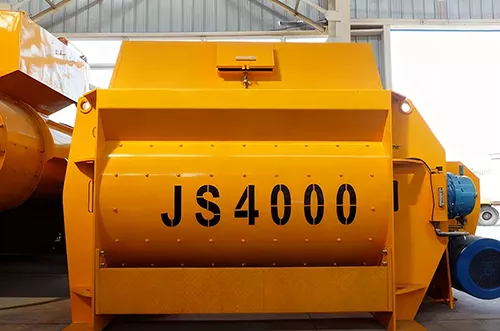 JS4000 Concrete Mixer
JS4000 Concrete Mixer
Discharging Volume: 4000L | Capacity of Mixer: 4.0 m³
Concrete Mixer Machine Capacity
| Model | Feeding Capacity (L) | Discharging Capacity (L) | Theoretical Productivity (m³/h) | Application Scenario |
| JS500 | 800 | 500 | ≥25 | Small Mixing Plant (HZS25) |
| JS750 | 1200 | 750 | ≥35 | Small Mixing Plant (HZS35) |
| JS1000 | 1600 | 1000 | ≥50-60 | Medium Mixing Plant (HZS50/HZS60) |
| JS1500 | 2400 | 1500 | ≥75-90 | Medium Mixing Plant (HZS75/HZS90) |
| JS2000 | 3200 | 2000 | ≥100-120 | Large Mixing Plant (HZS120) |
| JS3000 | 4800 | 3000 | ≥150-180 | Large Mixing Plant (HZS180) |
| JS4000 | 6000 | 4000 | ≥200-240 | Extra-Large Mixing Plant (HZS240) |
Types of Concrete Mixer Machines
Concrete Mixers by Mixing Method
Gravimetric Concrete Mixer (Self-falling Type)
Working Principle: By rotating the mixing drum, the materials inside are lifted to a certain height and then allowed to fall freely under their own weight. This process is repeated continuously to achieve uniform mixing.
Features:
- Simple structure, easy maintenance.
- Low energy consumption.
- Relatively weak mixing intensity, suitable for plastic concrete and low-flow concrete.
Common Models: Drum-type mixers (gradually being phased out), cone-shaped reverse discharge mixers.
Forced Concrete Mixer (Compulsory Type)
Working Principle: The mixing drum is stationary, and materials are forcibly mixed by a rotating shaft (or multiple shafts) with blades inside the drum, generating strong shear, convection, and extrusion to quickly achieve uniform mixing.
- High-quality mixing, efficient, and more uniform.
- Suitable for dry-hard concrete, high-strength concrete, and lightweight concrete.
- Complex structure, higher energy consumption, and relatively higher wear.
Common Models: Horizontal shaft mixers (single shaft, double shaft), vertical shaft mixers (pan type).
Concrete Mixers by Mobility
Portable Concrete Mixer
The Portable Concrete Mixer is a small-sized, easily movable concrete mixing equipment, usually powered by an electric motor or a small diesel engine. It is suitable for residential construction, road maintenance, and small-scale construction projects. It can quickly mix cement, aggregates, and water on-site, is easy to operate and maintain, making it an ideal choice for small to medium projects and household construction.
Self Loading Concrete Mixer
The Self Loading Concrete Mixer integrates loading, mixing, and transportation in one unit, capable of automatically completing raw material loading, weighing, mixing, and discharging. Equipped with a four-wheel drive system and a driver's cabin, it can adapt to various complex terrains and efficiently produce concrete without a fixed mixing station. It is widely used in rural construction, road projects, and medium to large-scale engineering projects.
- Mini Self Loading Concrete Mixer: Compact model for small sites.
- Self Loading Concrete Mixer with Pump: Combines mixing and pumping.
- Self Propelled Concrete Mixer: High mobility for uneven terrain.
Concrete Mixers by Structure Design
- Twin Shaft Concrete Mixer: A high-efficiency mixer with dual horizontal shafts, delivering fast and consistent mixing for ready-mix and precast concrete.
- Planetary Concrete Mixer: Provides thorough, uniform mixing action, ideal for precast elements and decorative concrete applications.
- Pan Concrete Mixer: A compact, easy-to-clean mixer designed for laboratories, testing facilities, or small batch production.
- Reversible Drum Concrete Mixer: Uses a reversible drum mechanism for both mixing and discharging, perfect for on-site concrete preparation.
- Tilting Drum Concrete Mixer: Features a tilting drum for easy discharge, commonly used in small construction and residential projects.
- Continuous Concrete Mixer: Enables continuous input and output of materials, suited for road, tunnel, and large infrastructure works.
- Refractory Pan Mixer: Built for mixing refractory materials, dry mortars, and other abrasive compounds with high durability.
- Foam Concrete Mixer Machine: Produces lightweight foam concrete for insulation, filling, and soundproofing applications.
Concrete Mixers by Power Source
- Electric Concrete Mixer: Energy-saving and quiet, suitable for areas with stable power supply.
- Diesel or Petrol Concrete Mixer: Independent power system, suitable for remote or outdoor construction sites.
Concrete Mixers by Application or Size
Mini / Small Concrete Mixer
Low cost and easy operation; ideal for DIY and small-scale construction.
Industrial / Large Concrete Mixer
High-capacity and durable, suitable for ready-mix plants and infrastructure projects.
- Universal Concrete Mixer Machine
- Construction Concrete Mixer Machine
- Big Concrete Mixer Machine
- Ready Mix Concrete Mixer Machine
Advantages of Concrete Mixer Machines
Improve Concrete Mixing Efficiency
Concrete mixers can quickly and uniformly mix raw materials such as cement, aggregates, and water, shortening mixing time and improving construction efficiency, especially suitable for large-scale construction projects.
Ensure Stable Concrete Quality
Mechanical mixing avoids unevenness caused by manual mixing, resulting in more consistent concrete strength and density, reducing construction quality risks.
Save Labor Costs
Using concrete mixers significantly reduces the manpower and time required for manual mixing, lowering labor costs while improving construction efficiency.
Easy Operation and Maintenance
Modern concrete mixers are often equipped with electric or hydraulic control systems, making them easy to operate, clean, and maintain, suitable for various construction sites.
Various Models to Meet Different Needs
From small household mixers to large commercial concrete batching plants, models can be flexibly selected based on project scale to meet different requirements.
Accelerate Construction Progress
Strong mechanized continuous mixing capability ensures sufficient concrete supply on-site, speeding up pouring and improving overall project schedule efficiency.
Components of Concrete Mixer Machines
- Mixing System: Mixing drum and blades, the core working part.
- Feeding System: Includes hopper, hoist, or belt conveyor, used to deliver aggregates and cement into the mixing drum.
- Water Supply System: Includes water tank, pump, and water meter, used to precisely control water addition.
- Discharge System: Discharges mixed concrete through tilting the hopper or opening the discharge door.
- Power System: Electric motor or diesel engine, provides power for the whole machine.
- Chassis and Support: Mobile mixers have wheels and towing frames; stationary mixers have a solid base.
- Electrical Control System: Controls start, stop, and timing of the entire mixing process.
Applications of Concrete Mixer Machines
- Construction Projects: Houses, bridges, roads, and other infrastructure construction, for on-site pouring.
- Precast Component Factories: Production of cement pipes, cement bricks, precast floor slabs, etc.
- Small-scale and Residential Projects: Home renovation, courtyard paving, rural self-built houses, etc.
- Water Conservancy and Municipal Projects: Situations requiring large and continuous concrete supply.
Auxiliary Equipment for Concrete Mixers
- Concrete Mixer Pump:Concrete Mixer Pump integrates mixing and pumping functions, enabling efficient on-site concrete delivery.
- Concrete Mixer Truck:Concrete Mixer Truck transports and continuously stirs concrete, ensuring it remains uniform during transit.
- Concrete Lift Machine:Concrete Lift Machine lifts concrete to higher floors, facilitating vertical construction efficiently.
- Concrete Mixer Lift Machine:Concrete Mixer Lift Machine combines concrete mixing and vertical lifting, streamlining construction workflow.
- Hydraulic Pan Mixer:Hydraulic Pan Mixer delivers uniform and high-quality concrete through a robust hydraulic mixing system.
- Hydraulic Hopper Concrete Mixer Machine:Hydraulic Hopper Concrete Mixer Machine efficiently feeds, mixes, and discharges concrete with minimal labor.
Concrete Mixer Frequently Asked Questions (FAQ)
What are the types of concrete mixers?
Common types include:
- Twin Shaft Mixer: High-speed and efficient, suitable for large-scale mixing.
- Planetary Mixer: Offers excellent mixing uniformity, ideal for precast components or decorative concrete.
- Pan Mixer: Compact and easy to maintain, suitable for laboratories or small-batch production.
- Mini/Electric Mixer: Convenient for on-site construction use, powered by electricity or diesel.
How to choose the mixer power and capacity?
- Capacity depends on the mixer type and volume.
- For small projects, single-shaft or electric mini mixers are suitable.
- For large projects, it is recommended to use a twin-shaft mixer paired with a concrete batching plant.
What is the service life of a concrete mixer?
Generally, with proper maintenance and normal operation, the service life can reach 5–15 years.
Regular inspection of bearings, seals, motor, and gearbox can extend the service life.
How to control mixing time and uniformity?
Typical mixing time is 30–120 seconds (depending on the type of concrete).
Twin-shaft mixers provide high mixing uniformity, while planetary mixers are best for fine concrete.
Concrete Mixer Selection Guide
Select model based on project scale
- Small projects: Choose electric or small diesel mixers for easy mobility and operation.
- Medium projects: Choose pan or single-shaft mixers to balance capacity and cost.
- Large projects or batching plants: Choose twin-shaft mixers for high efficiency and high output.
Select mixer according to concrete type
- For high-strength or decorative concrete: Planetary mixers are recommended.
- For general commercial or construction concrete: Twin-shaft mixers are efficient and widely applicable.
Consider power source and working environment
- Electric mixers: Suitable for urban or power-supplied sites, low noise, and easy maintenance.
- Diesel/Petrol mixers: Suitable for remote or outdoor construction sites, no external power required.
You May Also Want to Know
Concrete Mixer Machine with Pump This concrete mixer with pump integrates mixing and pumping functions, allowing concrete to be efficiently delivered directly from the mixer to the pouring location through pumping pipes. It greatly saves labor and time costs, making it ideal for small and medium-sized construction projects such as buildings, bridges, and tunnels.
Concrete Mixer Machine with Pipe This concrete mixer is equipped with a pipe conveying system that can transport mixed concrete through connected pipelines to the construction site for continuous pouring. The pipe layout is flexible and can be adjusted according to the site layout, making it suitable for projects requiring long-distance or high-level concrete pouring.



